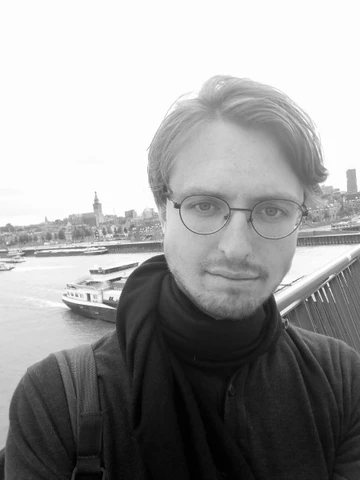Lukas Meisner
lukas.meisner@uni-erfurt.deDoktorand (Max-Weber-Kolleg für kultur- und sozialwissenschaftliche Studien)
Besucheranschrift
Max-Weber-Kolleg für kultur- und sozialwissenschaftliche Studien
Campus
Nordhäuser Str. 63
99089 Erfurt
Postanschrift
Universität Erfurt
Max-Weber-Kolleg für kultur- und sozialwissenschaftliche Studien
Postfach 90 02 21
99105 Erfurt

CV
CURRICULUM VITAE
- Since 2020 | Cotutelle de Thèse at the Max Weber Centre for Advanced Cultural and Social Studies, University of Erfurt (second supervisor PD Dr. Christoph Henning)
- Since 2019 | PhD in Philosophy within the European Research Council Project Early Modern Cosmology, Section Political Epistemology, Ca' Foscari University of Venice (first supervisor Prof. Pietro Daniel Omodeo)
- 2019-2020 | Q-Tutorials at Humboldt University of Berlin (SS19: 'Avantgarden vom Kopf auf die Füße gestellt. Kritik an Kunst vs. Künstlerkritik'; WS19/20: 'Kapital, Kreativität, Konsum – Von der Krise zur Künstlerkritik zum Spektakel des Kulturkapitalismus')
- 2018 | Tutor at the Arts Tutoring Society, Goldsmiths College, University of London
- 2017-2018 | M.A. in Critical and Creative Analysis (Sociology Department) at Goldsmiths College, University of London
- 2012-2016 | B.A. in Philosophy and Comparative Literature at the University of Tübingen, the University of Essex (Erasmus), and the Free University of Berlin
- 2012 | Abitur, Sankt Meinrad Gymnasium, Rottenburg/ Neckar
Forschungsprojekt
The goal of my PhD project is to develop a Critical Theory of Political Autonomy. I will be doing this along the lines of a 'project of modernity' not bracketed by capitalist (post-)modernisation variants.
The more postmodern strands of today's Frankfurt School tend to transform Critical Theory into what may be called 'Post-Critical Post-Theory'. They do so by claiming transcending 'critique' to be paternalistic and elitist if not unjustifiable, and emancipatory 'theory' to be metaphysical and totalising if not totalitarian. Arguing against this with a framework delivered by Fredric Jameson, I attempt at deconstructing the postmodern itself as a 'condition' and 'spirit' of cultural capitalism both older and more sustainable than its academic vogues. In fact, with the help of Manfredo Tafuri, my project deciphers a phenomenon as early as the historic avant-gardes as a vanguard 'artistic critique' or 'cultural politics' of cultural capitalism. Consequentially, postmodernism turns out to be the concomitant ideology of a postmodern 'mode of accumulation' that has evolved throughout the 20th century, and that still is in place today. As such, however, it lacks legitimate justification.
An alternative way to go for Critical Theory is to approximate what Jürgen Habermas has called the 'project of modernity'. I will demonstrate in which sense Post-Critical Post-Theory's participation in completely discharging this 'project' is more a mimicry of capitalist developments than an advancement in pluralist or democratic contents. Yet, to not remain trapped in the 'dialectics' (Adorno), 'aporias' (Habermas), or 'paradoxes' (Honneth) of the 'project of modernity' either, rescuing this project from postmodernism also means rescuing it from (post-)modernisation – this is, not only from cultural but from any and all forms of capitalism.
The condensed theoretical result of such a 'rettende Kritik' could be called, with R. Forst, 'political autonomy'. My project will show in which sense its criteria for valid critique are pre-normative and pluralist – and thus well-prepared to refute postmodern accusations. To become also transcapitalist, however, 'political autonomy' is dependent on the excavation of an often overlooked reception line within the Frankfurt School, which is a heterodox version of existentialist Marxism. Whereas in the first generation, it was represented by Herbert Marcuse, and in the second generation by Alfred Schmidt, it is missing in the contemporary Frankfurt School landscape – although Martin Hägglund has recently updated it from outside its confines.
By continuing this line for today's Frankfurt School, I approach a Critical Theory of Political Autonomy beyond both, capitalism and postmodernism. This approach can also lay the foundations for a reactualisation of the core concepts 'alienation', 'reification', and 'ideology' – which is my research's contribution to Political Epistemology, as it is currently getting developed within my Venetian research group.
Forschungsthemen
-
Critical Theory, Marxisms and the Frankfurt School
-
Modernisation vs. the project of modernity
-
Historiographies of capitalism, especially for the 20th century
-
Modernism, the historic avant-gardes, and the postmodern
-
Material ideology, objective alienation, liquid reification
-
Political autonomy, democratic socialism, pacified existence

